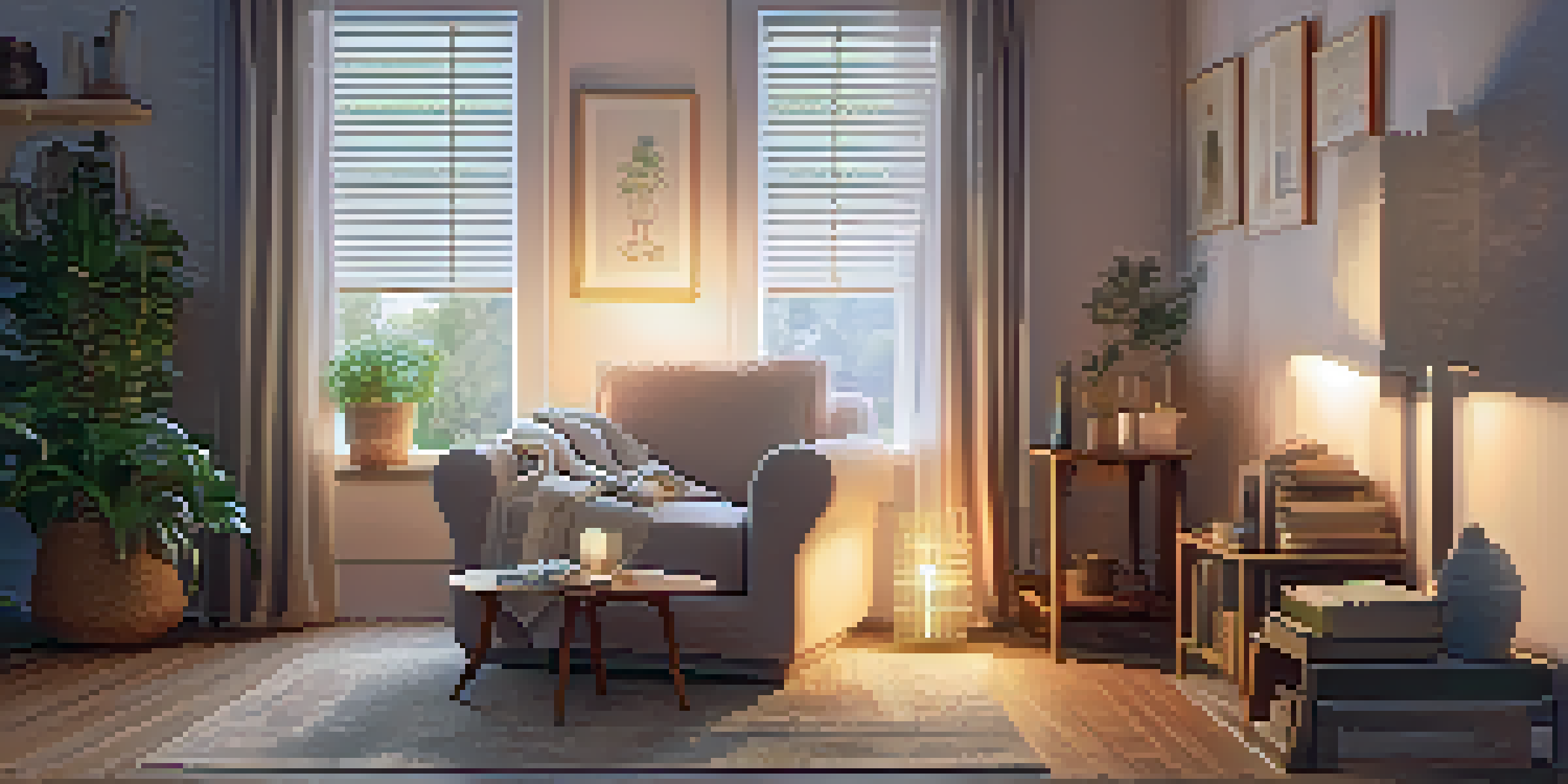How to Create a Relaxing Evening Routine

Why an Evening Routine is Essential for Relaxation
An evening routine serves as a bridge between the hustle of the day and the tranquility of night. It helps signal to your body that it's time to wind down, promoting better sleep and overall well-being. Just like a warm cup of tea can soothe the soul, a structured routine can ease your mind and prepare you for restful slumber.
The greatest weapon against stress is our ability to choose one thought over another.
Many people find that without a routine, their evenings can become chaotic, filled with distractions from screens or stress about the day’s events. By creating a dedicated time for relaxation, you can prioritize your mental health and create a sense of calm. This practice can be especially beneficial after busy days, allowing you to reset and recharge.
Incorporating an evening routine into your life doesn't require drastic changes. It can be as simple as setting aside time to read, meditate, or practice gentle stretches. The key is to make it a consistent part of your day, helping your body recognize that it’s time to relax.
Setting a Consistent Sleep Schedule
One of the most effective ways to enhance your evening routine is by establishing a consistent sleep schedule. Going to bed and waking up at the same time each day helps regulate your body's internal clock. This can lead to improved sleep quality, making it easier to fall asleep and wake up feeling refreshed.

Consider setting a specific bedtime that allows enough time for rest, ideally 7-9 hours, depending on your needs. You can even create a gentle reminder for yourself as bedtime approaches. Just like a train running on schedule, your body will learn when to expect rest, making it simpler to unwind.
Establish an Evening Routine
Creating a consistent evening routine helps signal to your body that it's time to relax, promoting better sleep and mental well-being.
Additionally, be mindful of your wake-up time, ensuring you stick to it even on weekends. This consistency reinforces your body’s rhythm, making it easier to slip into relaxation mode each evening. In no time, you’ll find that both your evenings and mornings become more harmonious.
Creating a Calming Environment
Your environment plays a crucial role in your ability to relax. A cluttered or chaotic space can lead to a cluttered mind, making it difficult to unwind. Consider decluttering your evening space and transforming it into a sanctuary that invites calmness.
Happiness is not something ready-made. It comes from your own actions.
Soft lighting, soothing colors, and comfortable furnishings can all contribute to a serene atmosphere. Think about adding elements like scented candles or essential oil diffusers to engage your senses and promote relaxation. Just as a cozy blanket wraps you in warmth, a calming environment envelops you in peace.
Also, consider reducing noise and distractions. If possible, turn off electronic devices or keep them out of reach during your evening routine. This simple step can help you focus on relaxation, making it easier to transition from the day’s activities to a restful evening.
Incorporating Mindfulness Practices
Mindfulness practices are excellent tools for easing stress and promoting relaxation. Simple techniques like deep breathing, meditation, or journaling can help quiet your mind and bring you into the present moment. Imagine taking a deep breath like a wave washing over you, clearing away the day’s concerns.
You don’t need to dedicate hours to these practices; even just a few minutes can make a difference. Try sitting in silence, focusing on your breath, or jotting down your thoughts in a journal. This helps you process the day and can create a sense of closure before bedtime.
Limit Screen Time Before Bed
Reducing screen time before bed helps your brain unwind, enhancing sleep quality and fostering a more peaceful transition to night.
Incorporating mindfulness into your evening routine can also improve your overall mental health. It helps create a space for reflection and gratitude, reinforcing positive thoughts as you wind down for the night. This shift in focus can make your evenings feel more fulfilling and peaceful.
Engaging in Relaxing Activities
Finding activities that you enjoy can make your evening routine more effective and enjoyable. Reading a book, listening to soothing music, or practicing gentle yoga can significantly contribute to your relaxation. Just like a favorite movie can transport you to another world, these activities can help shift your mind away from daily stressors.
Consider alternating activities each night to keep things fresh and engaging. One evening, you might dive into a captivating novel, while another might be perfect for a calming bath. Mixing things up can help prevent your routine from feeling monotonous and keep you excited for your wind-down time.
Remember, the key is to choose activities that resonate with you personally. What relaxes one person might not work for another, so trust your instincts and experiment. This exploration is all part of finding what helps you unwind best.
Limiting Screen Time Before Bed
In our digital age, it’s all too easy to get caught up in screens before bed. However, excessive screen time can interfere with your sleep quality due to the blue light emitted by devices. This light can trick your brain into thinking it’s still daylight, preventing the natural release of melatonin, the hormone that signals sleep.
To enhance your evening routine, set a specific time to unplug from devices, ideally at least an hour before bed. This allows your mind to relax without the stimulation of notifications or bright screens. Think of it as giving your brain a gentle timeout, creating space for calm and relaxation.
Practice Gratitude at Night
Reflecting on positive moments from your day can shift your focus from stress to appreciation, leading to improved mood and mental health.
You can fill this tech-free time with the calming activities we discussed earlier—reading, meditating, or simply enjoying a cup of herbal tea. By prioritizing a screen-free environment, you’ll likely notice improved sleep and a greater sense of peace as you settle in for the night.
Reflecting on Your Day with Gratitude
Ending your day with gratitude can significantly impact your mood and mindset. Reflecting on the positive moments of your day, no matter how small, helps shift your focus from stress to appreciation. Imagine tucking in the day's worries and pulling out the joys like treasures you’ve collected.
You can practice gratitude through journaling or simply taking a moment to think about what you’re thankful for. This practice not only boosts your mood but can also improve your overall mental health. It’s like giving your mind a warm hug before bed, fostering positive feelings that can carry into tomorrow.

Make it a habit to note down at least three things you’re grateful for each evening. Over time, this can help cultivate a more positive outlook on life, making your evenings feel even more fulfilling. As you make gratitude a regular part of your routine, you’ll notice a shift in your perspective, leading to a more peaceful mind.